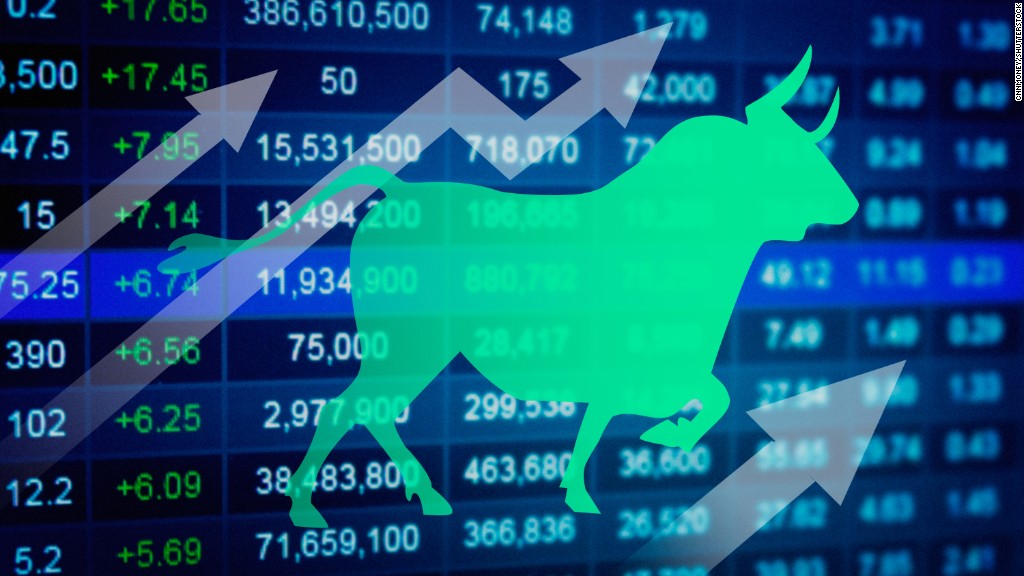
Carl Icahn is such a fan of President Trump that on election night he literally left the victory party early to buy stocks that were crashing in the overnight markets.
Icahn was one of Trump's earliest backers on Wall Street and the billionaire investor even agreed to serve as the president's special adviser on regulatory reform.
Despite all that Trump enthusiasm, Icahn's hedge fund seems to be positioning for the end of the Trump party.
Icahn Enterprises (IEP), which Icahn controls and serves as chairman of, quietly disclosed last week that it had a net short position in its investment portfolio of 128% as of the end of last year. That's a fivefold increase from the end of 2015.
The net short position means Icahn's firm is betting against 1.3 shares for every one share it's betting on. In other words, Icahn's investment portfolio will generally gain value when prices decline, and vice versa.
"I am concerned at this point that the market has run ahead of itself," Icahn told CNNMoney in a phone interview on Tuesday.
Icahn said one "worrisome thing is that so much money has run into ETFs." Icahn voiced concern that the flood of retail money into passive investments like ETFs will create a stampede when markets turn south.
However, Icahn explained that his firm isn't as negative as suggested by the net short figure, which only covers its investment segment and not its various other holdings.
He noted that Icahn Enterprises has a lot of control positions that are not counted in the investment segment. For instance, Icahn Enterprises owns Pep Boys and manufacturer Federal-Mogul.
Related: A lot has to go right for Trump rally to continue
But Icahn Enterprises' top executives sounded very cautious during last week's conference call.
"We continue to have a fairly bearish view," Icahn Enterprises CEO Keith Cozza said during the call.
"The market does seem to be priced for perfection," he said.
Besides the short position, Icahn's firm is also taking some defensive maneuvers. In December, it sold American Railcar Leasing for up to $3.4 billion and last week it unloaded the shuttered Trump Taj Mahal casino in Atlantic City to the company behind the Hard Rock Café for an undisclosed sum.
The investment company also refinanced $1.2 billion of debt and raised $600 million in cash through a stock offering. The firm's balance sheet has slashed its total debt to the lowest level in nearly three years.
"It's not the greatest time for large, long investments," Icahn's CEO said during the call.
Icahn executives voiced concern about "very high market multiples."
The S&P 500 is trading at 17.9 times forward earnings, the highest P/E ratio since 2004, according to FactSet.
Valuation levels have climbed to high levels because the big Trump rally -- the S&P 500 is up 11% since November 8 -- has been fueled by expectations of tax cuts and other stimulus, not fundamental improvement in corporate profits.
Related: Trump vows to bring drug prices 'way down'
Icahn Enterprises declined to explain which specific industries the firm is betting against. However, Cozza seemed worried about Trump's trade plans, saying that "certain industries" are "especially susceptible to potential border adjusted tax plans."
House Republicans have proposed a border adjustment tax that aims to encourage more companies to make things in the U.S. by imposing a tax on imported goods. Retailers are strongly opposed to a BAT because it could make the imported goods they sell a lot more expensive.
Icahn's cautious positioning stands in contrast to his opportunistic stance back in early November. As global markets panicked over Trump's victory, Icahn literally left the victory party in Manhattan early to buy "a lot of stock" in overnight markets.
"I'm sad I didn't buy a lot more," Icahn told CNN's Poppy Harlow in early December.
But Icahn also signaled uneasiness over the rally in that interview, which was conducted as the Dow was fast approaching the 20,000 milestone. The billionaire said the rally had "gone too far."
Of course, the markets have only gotten higher since then. Last week, the Dow zoomed past the 21,000 level following Trump's well-received speech to Congress. CNNMoney's Fear and Greed Index is flashing "greed" and last week it even tipped over into "extreme greed" mode.
This is hardly the first time Icahn has gone negative on the market. He emerged as a vocal bear in 2015, warning of a "catastrophe" in a September 2015 video dubbed "Danger Ahead."
Icahn's firm was 149% net short as of last June amid worries about a bubble in risky junk bonds.
But the numbers put out last week show that Icahn's firm remains very cautious despite Trump's victory.


